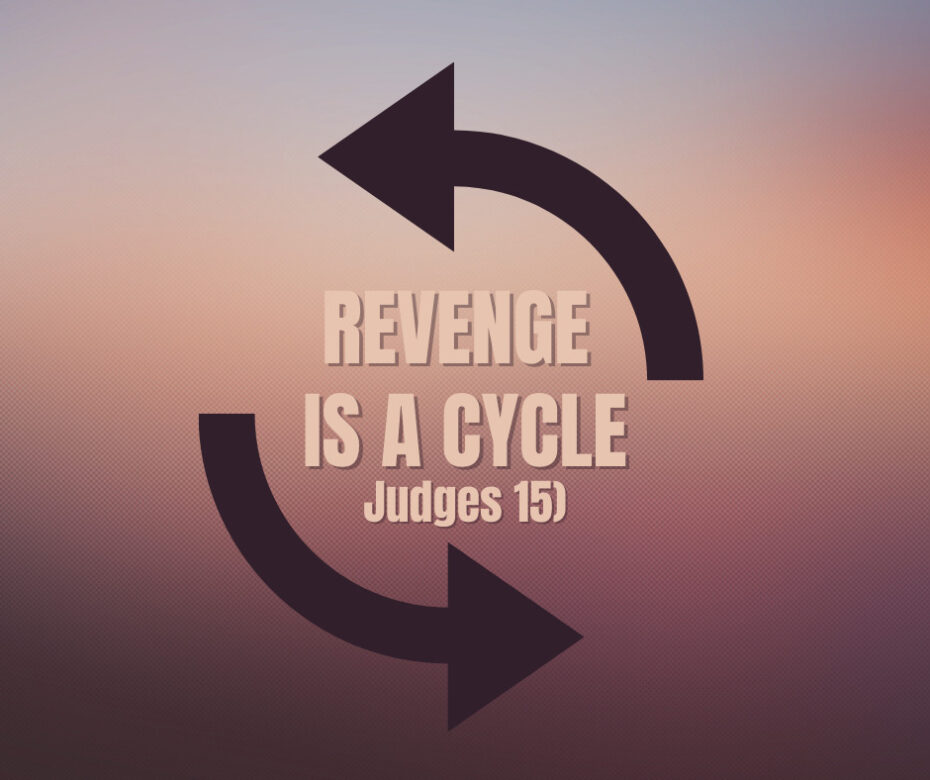Judges 14-15 is a study in the cycle of revenge.
It all started with Samson’s troubled relationship with women.
Did you know that before his infamous entanglement with Delilah, Samson had an unnamed Philistine wife? Their relationship was rocky from the start. However, God planned to use Samson’s woman troubles “to move against the Philistines” (Judg 14:4), and the results were bloody.
For example, during his bachelor party, Samson bet his thirty Philistine groomsmen a new wardrobe if they could answer his riddle. They accepted the challenge but couldn’t come up with the solution. So they turned to extortion and threatened to burn Samson’s wife and her father to death unless she got the answer out of him. Instead of telling Samson about the threat, she kept it secret, and for the next seven days, cried and badgered Samson for the answer. “Don’t you love me?” He finally relented. As soon as she learned the answer, she told the groomsmen, who told Samson, causing him to lose the bet (Judg 14:17-18). As a result, Samson went on a Spirit-empowered killing spree. He executed thirty other Philistines and gave their clothes to the thirty groomsmen (Judg 14:19).
As it turns out, the trouble had only just begun.
Later, when Samson went to give his wife (his betrothed?) the gift of a young goat, he learned she had been given to his best man! (Judg 14:20;15:2). In revenge, Samson set the Philistine’s fields, vineyards, and olive groves on fire. The result was the modern equivalent of millions of dollars in damages.
Then, in revenge, the Philistines burned Samson’s wife and her father to death (Judg 15:6).
Then Samson killed them (Judg 15:7-8).
The tension escalated as Philistines formed military positions in Judah (Judg 15:9), and three thousand men of Judah went to arrest Samson and give him over to the enemy (Judg 15:13). But that only set up Samson to kill a thousand Philistine men with a donkey’s jawbone (Judg 15:15).
Violence begat violence.
And that cycle continued after Samson married Delilah. She, too, betrayed him. That led to his enslavement, Samson’s self-sacrifice (suicide?), and thousands of more Philistine deaths (Judg 16:30).
The point is that when vengeance belongs to man, it becomes a morally ambiguous downward spiral of violence and death.
Now, in Samson’s case, God used that familiar sin pattern to work His wrath against Israel’s unique enemy, the Philistines.
As you have seen in the news, several cities in the US are in the throes of a cycle of revenge. The situation has been made worse by the COVID-19 lock-down measures and the economic destruction and social tensions caused by them. Perceived wrongs (still in litigation) have led to anger, collective blame, protests, and rioting. People have been killed, and businesses have been looted and burned. That has led to push-back, and more protests, and more rioting, death, and violence. As the circle of victims widens, the downward spiral tightens, spinning even faster. I have spoken to many people who have said, “I would love for them to try that here.”
Is that what the Christians’ attitude should be?
In his letter to the Romans, Paul counseled the believers against avenging themselves:
Beloved, do not avenge yourselves, but rather give place to wrath; for it is written, “Vengeance is Mine, I will repay,” says the Lord (Rom 12:19).
The way to break the cycle of vengeance is to refuse to be a part of it.
Now, your gut reaction may be to think that being passive is taking the coward’s way out. It isn’t. Not in this case. Refusing to become part of the revenge cycle is an act of faith that your passivity will “give place” to God’s own activity in revealing His wrath against sin.
As He promised, “I will repay.”


